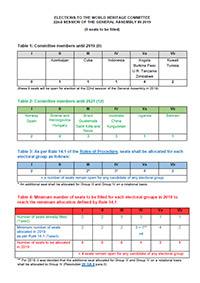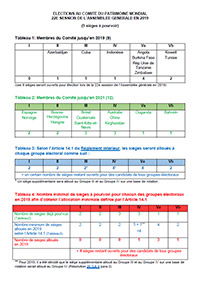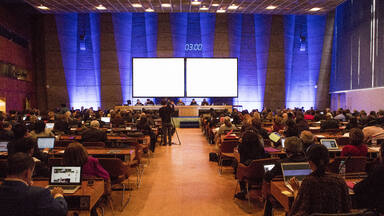23rd session of the General Assembly of States Parties
UNESCO, Paris 24-26 November 2021
The 23rd session of the General Assembly held at UNESCO Headquarters, from 3.00pm on 24 November until 1.00pm on 26 November 2021, in Room II.
In accordance with Article 8, paragraph 1 of the Convention concerning the Protection of the World Cultural and Natural Heritage, the General Assembly of States Parties to the Convention held its 23rd session during the 41st session of the General Conference of UNESCO.
Elections to the World Heritage
Committee in 2021
The General Assembly have been called upon, inter alia, to replace the outgoing members of the World Heritage Committee, in conformity with Rule 13.1 of the Rules of Procedures of the General Assembly of States Parties to the World Heritage Convention concerning the presentation of candidatures for election to the World Heritage Committee.
The following 12 States Parties are outgoing in 2021
Australia Bahrain Bosnia and Herzegovina Brazil China Guatemala Hungary Kyrgyzstan Norway Saint Kitts and Nevis Spain Uganda
12 States Parties were elected to the World Heritage Committee
Argentina Belgium Bulgaria Greece India Italy Japan Mexico Qatar Rwanda Saint Vincent and the Grenadines Zambia
Results of the election of World Heritage Committee members
Candidatures Received
| State Party | Electoral Group | Proposed duration of mandate (years) | Previous mandates | CVs of experts* |
|---|---|---|---|---|
| Antigua and Barbuda | Group III | 4 years (2021-2025) |
0 | |
| Argentina | Group III | 4 years (2021-2025) |
2 1978-1985 2001-2005 |
|
| Barbados | Group III | 4 years (2021-2025) |
1 2007-2011 |
|
| Belgium | Group I | 4 years (2021-2025) |
1 1999-2003 |
|
| Bulgaria | Group II | 4 years (2021-2025) |
2 1978-1983 1985-1991 |
|
| Chile has withdrawn its candidature by letter dated 22 November 2021 |
Group III | |||
| Colombia | Group III | 4 years (2021-2025) |
3 1989-1995 1999-2005 2011-2015 |
|
| France has withdrawn its candidature by letter dated 4 June 2021 |
Group I | |||
| Greece | Group I | 4 years (2021-2025) |
2 1985-1991 1997-2003 |
|
| India | Group IV | 4 years (2021-2025) |
3 1985-1991 2001-2007 2011-2015 |
|
| Italy | Group I | 4 years (2021-2025) |
4 1978-1985 1987-1993 1993-1999 1999-2001 |
|
| Japan | Group IV | 4 years (2021-2025) |
3 1993-1999 2003-2007 2011-2015 |
|
| Jordan has withdrawn its candidature by letter dated 11 August 2021 |
Group Vb | |||
| Mexico | Group III | 4 years (2021-2025) |
4 1985-1991 1991-1997 1997-2003 2009-2013 |
|
| Mongolia | Group IV | 4 years (2021-2025) |
0 | |
| Morocco has withdrawn its candidature by letter dated 19 November 2021 |
Group Vb | |||
| Qatar | Group Vb | 4 years (2021-2025) |
1 2011-2015 |
|
| Rwanda | Group Va | 4 years (2021-2025) |
0 | |
| Saint Vincent and the Grenadines | Group III | 4 years (2021-2025) |
0 | |
| Sweden has withdrawn its candidature by letter dated 18 September 2020 |
Group I | |||
| Ukraine has withdrawn its candidature by letter dated 22 June 2021 |
Group II | |||
| Zambia | Group Va | 4 years (2021-2025) |
0 |
* At its 20th session (UNESCO, 2015), the General Assembly approved the following format for the experts’ CVs in the field of cultural/natural heritage.
FAQs about the election of World Heritage Committee members
There are 21 Committee members represented by 21 States Parties to the World Heritage Convention.
Until the end of the 41th General Conference (2021), the following States Parties are members of the Committee:
Australia Bahrain Bosnia and Herzegovina Brazil China Egypt Ethiopia Guatemala Hungary Kyrgyzstan Mali Nigeria Norway Oman Russian Federation Saint Kitts and Nevis Saudi Arabia South Africa Spain Thailand Uganda
Elections to replace outgoing Committee members take place during the General Assembly of States Parties, meeting every two years during the General Conference of UNESCO (Article 8.3of the Convention ).
The 23rd session of the General Assembly of States Parties to the World Heritage Convention will take place during the 41th session of the General Conference of UNESCO in 2021 (dates to be confirmed).
According to the Convention, a Committee member's mandate is for 6 years.
The General Assembly (Resolution 13 GA 9, paragraph 6) invites the States Parties to the World Heritage Convention to voluntarily reduce their term of office from six to four years.
In 2021, a total of 12 Committee members will be elected.
Rule 13 of the Rules of Procedure of the General Assembly foresees that “the Secretariat shall ask all States Parties, at least three months prior to the opening of the General Assembly, whether they intend to stand for election to the World Heritage Committee” and that “ the list of candidates shall be finalized 48 hours before the opening of the General Assembly”. Rule 14 (f) provides that “ballot(s) for allocated seat(s) shall precede the ballot(s) for the remaining seats to be filled” and that “unsuccessful candidates in a ballot for any allocated seat shall be eligible to stand for election in subsequent ballot(s)”.
A candidature is submitted for a vacant seat without distinction of whether these seats are allocated seats or open seats. It follows that the Rules of procedure do not foresee the possibility for a State Party to submit a candidature only for an open seat in the World Heritage Committee when allocated seats are vacant.
In addition, only those candidates that have been unsuccessful in a ballot for allocated seats (because they have not been elected) or candidates from an electoral group for which there is no vacant allocated seat at the session may stand for election for an open seat. This procedure does not allow for candidates to stand for election only for open seats when allocated seats are vacant for their respective electoral group.
According to Rule 13.2 of the Rules of procedure of the General Assembly, members of the World Heritage Committee may stand for election again after a gap of 6 years after the expiry of their mandate.
Following the 1st Extraordinary Session (UNESCO, 2014), the General Assembly amended its Rules of Procedures in order to achieve the goal of an equitable geographical and cultural representation on the World Heritage Committee, through the allocation of seats by region (defined with reference to UNESCO’s electoral groups) on the World Heritage Committee.
For more details please refer to Article 14 of the Rules of Procedures.
As per Rule 13.1 of the Rules of procedure of the General Assembly, candidatures should be sent to the Secretariat at least six weeks prior to the opening of the General Assembly.
As per Rule 13.4, this list of candidatures shall be finalised 48 hours before the opening of the General Assembly. No other candidatures nor payments of compulsory and voluntary contributions to the World Heritage Fund (for the purpose of presenting a candidature to the Committee) will be accepted in the 48-hour period prior to the opening of the General Assembly.
Candidatures should be sent to the following address:
The Director
UNESCO World Heritage Centre
7 place de Fontenoy
75352 Paris 07 SP, France
As per article 16.5 of the Convention:
"Any State Party to the Convention which is in arrears with the payment of its compulsory or voluntary contribution for the current year and the calendar year immediately preceding it shall not be eligible as a Member of the World Heritage Committee, although this provision shall not apply to the first election."
No, there is no provision.
The Rules of Procedure adopted by the General Assembly inNovember 2014 state that “at each election, due consideration shall be given to the election of at least one State Party which has never served as a Member of the World Heritage Committee" (Rule 14.1d).
Please refer to Rule 14 of the Rules of Procedure of the General Assembly: "Election of the members of the World Heritage Committee"
All relevant documentation is available at the following web address : whc.unesco.org/en/documents (select the year, the session, the document reference or the title of the document ....)
With regard to the number of candidatures presented by an electoral group, it is worth recalling Resolution 1 EXT.GA 3 on the revision of the Rules of Procedure of the General Assembly (in 2014), by which the General Assembly of States Parties to the Convention "reiterate[d] its strong request to States Parties and electoral groups to provide a sufficient number of candidates for each seat and each election to ensure a genuine choice at each election.”
Nevertheless, in the event that an electoral group presents fewer candidates than seats allocated to that group, the General Assembly should be informed at the beginning of the session, and before the elections begin, so that the General Assembly can take a decision on the seat(s) that will remain vacant: allocation within the open seats, allocation to another electoral group, etc. Indeed, Rule 14.1.e) of the Rules of Procedure stipulates that "[i]n case the above formula [note: formula describing the distribution of seats within electoral groups] cannot be practically applied, an exceptional arrangement may be made to accommodate such special circumstances." In any event, the remaining vacant seat(s) shall be filled at the same session and not at subsequent elections, the Committee being composed of 21 members.
Bureau Members
Chairperson:
H.E. Mr Tebogo Seokolo (South Africa)
Rapporteur:
Mr Gytis Marcinkevičius (Lithuania)
Vice-Chairpersons:
Germany,
Honduras,
Iran (Islamic Republic of),
Syrian Arab Republic



